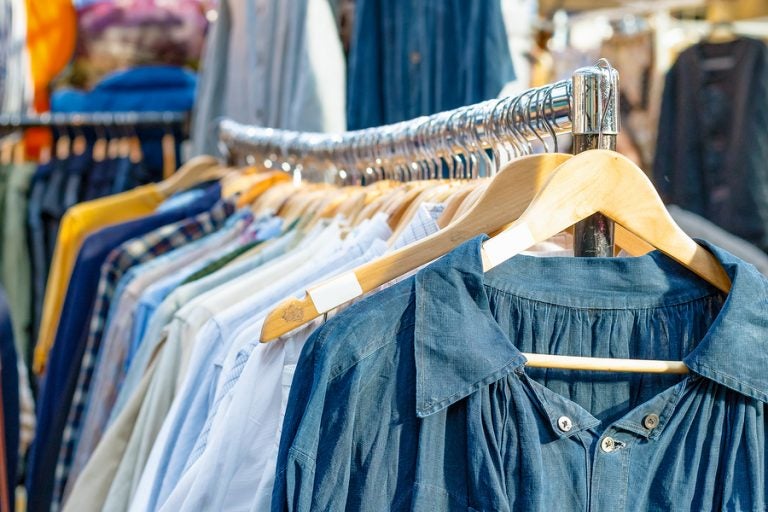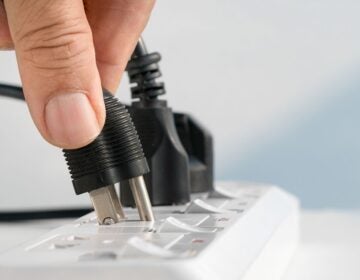Not all clothing collection bins are about good will
Gain space in your closet while improving the quality of life for someone less fortunate.

(Victor Huang/Big Stock Photo)
Ever wonder what really happens to things you toss into those unsightly clothing collection boxes? For years, I didn’t. It was easier to drop off my unwanted coats and shoes in the red box in the Acme parking lot than to drive to a Goodwill store. Or so I thought.
As it turns out, there are Goodwill stores in every section of Philly: South, West, Northeast, Roxborough, including one just a few blocks from my West Mount Airy home. And dozens of Goodwill locations are scattered throughout Southern New Jersey. So, what’s the difference between Goodwill and all those drop-off boxes? Plenty.

For starters, many of those bins are illegal. When I researched N.J. Clipper Corp., which maintains collection bins at a Chestnut Hill supermarket, I was shocked to find a “cease and desist” order against them filed by the Pennsylvania Department of State. The company is one of many clothing collection firms masquerading as a charity.
Meanwhile, Goodwill funnels money earned from selling secondhand items into job training for people who are disabled and disadvantaged. In 2016, according to its website, Goodwill placed more than 313,000 people in jobs and provided access to online training for 34 million people. In the process, it keep billions of pounds of clothing and computers out of landfills.
Think about it. You gain space in your closet while improving the life of someone less fortunate. Cleaning out grandma’s home when she moves into a retirement community doesn’t have to kill your weekend or your back. Goodwill does estate clean-outs — removing furniture, appliances, kitchenware, clothing, etc.
If schlepping your stuff to a Goodwill location sounds like a chore, consider turning it into a social gathering. That’s what my friend Dianne did. She sent out an email inviting dozens of women to bring their unwanted clothing to her Roxborough home for a swap party. We had an opportunity to pick through each other’s rejects, take what we wanted, send the rest to Goodwill. Besides clothes, we were asked to bring food and beverages. You get 25 women in a room full of clothes, jewelry, wine, and cake — believe me, it’s a party!
Within minutes, and a couple of glasses of chardonnay, total strangers became fast friends. We were a diverse group, all shapes, sizes, ethnicities, and ages — including librarians, legal investigators, pastry chefs, writers, singers, real estate agents, teachers, and moms. What we had in common was the satisfaction of seeing our unwanted hats, handbags, and shoes find new homes, as well as the novelty of snapping up items we admired for free.
There was no modesty. Women stripped down to bras and panties, trying on clothes in the living room. It reminded me of the communal dressing room at Loehmann’s. But without any “I saw it first” arguments.
Some items had never been worn. I scored a pair of brand-new lavender pajamas that, judging from the Macy’s tag, had been a Christmas gift that missed its mark. I also laid claim to a feathered cloche hat, two artsy necklaces, and a hammered-silver ring. While everyone left with a few attractive items (and pounds thanks to the hostess’s culinary skills), the bulk went to Goodwill.
Turning a cleaning chore into a social event was a lot more fun than stuffing my things into a lawn and leaf bag and dropping it off at an ominous mystery box.
How do you tell a legitimate collection box from a scam? Look for contact details, the name of the benefiting organization, info on what percentage of sales goes to charity, and a clear mission statement.
No name, no phone number? Forgettaboutit!
If you’re looking for a tax deduction (and who isn’t?) Goodwill provides valuation guidelines. Take a $12 deduction for every business suit, $150 for that old desktop computer, and $75 for a sofa. It adds up. If you’re in acquisition mode, Goodwill now offers a way to make a charitable contribution while you shop its online auction store. Everything from pet supplies to electronics. Who knew?
WHYY is your source for fact-based, in-depth journalism and information. As a nonprofit organization, we rely on financial support from readers like you. Please give today.




